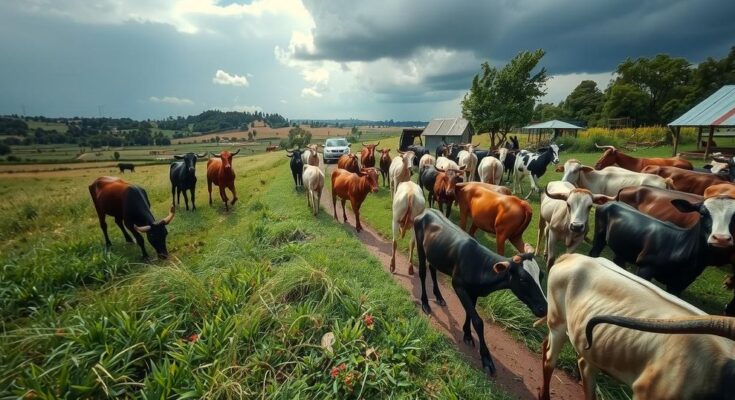Climate change is causing devastating livestock diseases that create tensions along the Kenya-Uganda border. Prolonged drought forces herders to cross borders in search of resources, leading to conflicts and increased vulnerability to diseases like Peste des Petits Ruminants. Community leaders advocate for joint health interventions and resource sharing to mitigate these challenges and promote peace and stability.
Climate change continues to exacerbate tensions along the Kenya-Uganda border, stemming from outbreaks of livestock diseases that spread unchecked across national boundaries. These highly contagious transboundary animal diseases impose severe socio-economic and public health repercussions on pastoral communities dependent on livestock for their livelihoods. Historically, the region has maintained a semblance of peace—particularly since 1973 when the Turkana and Matheniko communities interred their weapons at Lokiriama village, thereby fostering cross-border trade. However, increasing drought conditions have compelled pastoralists from the Turkana region to venture into Uganda’s Karamoja territory in search of pasture and water, exacerbating conflicts with armed bandits preying on vulnerable herders seeking relief. Mr. Korobe Ngasike, a herder from Nawountos village, expressed concerns regarding the deadly livestock diseases that accompany their search for grazing land. Diseases such as Peste des Petits Ruminants, which threatens goats and sheep, alongside vector-borne diseases prevalent in the region, contribute to significant livestock mortality. “Our search for pasture forces some of us to settle at border areas with a high burden of cattle vector-borne diseases and Peste des Petits Ruminants,” he stated. This reality is a stark contrast to past practices, where cattle rustling was common; the current situation has led to a shift in focus from raiding to disease mitigation due to the risks involved. The communities have recognized the need for joint health interventions during peace negotiations, leading to resolutions aimed at cooperative strategies in animal health. Mr. Joseph Areng, a Peace Building Officer at the Agency for Cross Border Pastoralists Development, highlighted the importance of mass livestock treatment and vaccination programs to ensure sustainable pastoral practices and coexistence among the communities. He emphasized that recognizing the impacts of climate change must propel communities to diversify their livelihoods for resilience. Challenges persist, as herders like Mr. Charles Ekai from Oropoi village face substantial livestock losses due to tsetse fly infestations, compounded by inadequate road infrastructure limiting access to veterinary care. “When there are no interventions from authorities, I am forced to drive my surviving livestock to Natira village, which sometimes die due to lack of pasture,” Mr. Ekai noted, reflecting the dire circumstances these herders face. Leaders from both sides have called for enhanced collaboration to address these emerging challenges. Turkana Governor Jeremiah Lomorukai and his Ugandan counterpart, Minister Peter Lokeris, underscored the significance of mutual cooperation in tackling the pressing issues plaguing border communities. Governor Lomorukai stated, “My administration is committed to increased collaboration with neighboring governments and deeper community engagements for sustainable development at the borderlands,” advocating for swift finalization of the revised Memorandum of Understanding and the Resource Sharing Agreements between Kenya and Uganda, which he labeled transformative for the socio-economic progress of the area. Dr. Lokeris reiterated the necessity of sustained peace for regional development, proposing that the peace agreement serves as a cornerstone for overcoming shared challenges like livestock diseases. Thus, the intersection of climate change, livestock health, and socio-political dynamics at the Kenya-Uganda border presents a multifaceted challenge requiring cooperative solutions that capitalize on the interdependence of the communities involved.
The crisis at the Kenya-Uganda border illustrates the pressing issues exacerbated by climate change, particularly affecting pastoral communities reliant on livestock. Transboundary animal diseases, which swiftly traverse national boundaries, are causing significant socio-economic repercussions, particularly in light of prolonged droughts and resource scarcity. The history of peace and cooperation in the region has been threatened by these environmental changes, necessitating urgent dialogue and strategic interventions to stem conflict and promote livelihood security among pastoralist communities.
The worsening impacts of climate change, particularly in the form of transboundary livestock diseases, are creating significant challenges for herders along the Kenya-Uganda border. Cooperative approaches, such as joint health initiatives and diversified livelihood strategies, are essential in mitigating conflicts and promoting sustainable development in this vulnerable region. The commitment to peace and resource sharing stands as a critical pillar for addressing these emerging threats and ensuring the socio-economic stability of the communities involved.
Original Source: nation.africa




